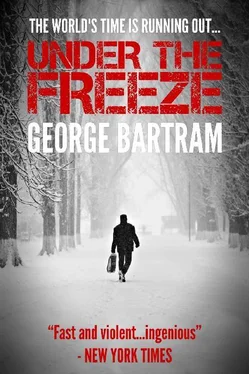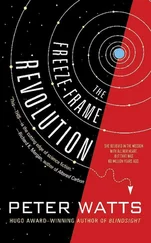The crowd turned left at the end of the bridge and he turned right, then left again into the little streets of St.-Germain. He had lived here during one winter. He did not envy these young ones now. He touched the button on his lapel, thinking of the futility of such gestures. Still, he left it where she had put it.
Ivan’s was a cafe not far from the church of St.-Germain-des-Près, as French as a tourist poster but recognizably Jewish to those who loved the food. In the mornings the pastries looked like relatives of New York’s Danish; at lunch and dinner Eastern Europe and Second Avenue were not too far away. Ivan’s had always been there for Tarp; it went back before the war, it was said, although Ivan, whoever he was, had disappeared with others of the Resistance. Today, its outdoor chairs were tipped against the tables and no waiters leaned in the doorway, watching for sidewalk customers. Inside, however, the brass and mahogany shone, and the warm smell of coffee mingled with that of pastry and something slightly sour that was being readied for lunch.
Tarp sat against a wall between two long windows. There were at least thirty people in the place, although it was early for lunch, late for breakfast. He ordered coffee and spread the Havana paper on the table so that the masthead was visible. Now that he was there, he could try to cleanse his mind of his anger and the dream. He sat quietly. He looked at a neutral piece of wall, which long before had been painted to imitate marble and then varnished so many times that it had become simply a varnish-colored space.
The Maxudov of the dream reappeared, with the face of the man he had not thought about in years. Is that what Maxudov was — one man in another? Or was it rather that Maxudov’s identity was less important than something else? Was it, instead, that Maxudov existed in relation to something else? A bargain has two hands , was the saying. So that it was not simply Maxudov… His attention flickered. Not simply Maxudov …
He had seen the rose. That was the signal, and it brought him back to the world of Ivan’s and the gleaming white button on his jacket, back to Givrage Atomique and the message from Havana. The rose was red, and its stem and and all but one leaf of the flower were wrapped in white paper. It was carried in the hand of a tall woman with a stunning figure who had come in and who was standing with her back to him so he could not see her face, one of those women who give Paris its reputation for style despite the silly clothes its designers force on other women. She was wearing blue jeans so tight they outlined the cleft of her buttocks; a wide leather belt of the sort that American bikers used to wear; high, shiny, cruel-looking boots with soft insteps; and a tan nylon jacket with a boyish, stand-up collar, the jacket so short it showed off most of the studded belt. She was wearing enormous sunglasses, but what he noticed was her hair, which was cut like a punk rocker’s, with a high comb of black, feathery strands along the top of her skull and short strands over her ears and around the back.
She strode to a table across the restaurant, turning toward him as she bent to sit. She was wearing a black T-shirt under the jacket, with a luridly fluorescent picture of a mushroom cloud and a fireball on it. Her face turned to him, as stark and beautiful as a piece of sculpture within the clasp of the demonic hair.
It was Juana.
He supposed he had been expecting her all along. It was a very different-looking Juana, to be sure. She looked slimmer. She did not look as if she came from a people’s republic of anything; her makeup was lavish and deliberate. She looked — there was no other way to put it — rich .
She saw him but she gave no sign of recognition. Tarp glanced around the restaurant; several men were looking at her. He was aware of motion near the door, but when he looked there, whoever had moved was gone. The dream, the idea about Maxudov, vanished at once; an internal alarm began to sound.
She stood up. She held the rose. Follow me , she and the rose were saying.
Tarp got up. Danger , his internal sense told him.
She had gone into a short corridor that led to the toilet. He started after her. His eyes continued to search the room for the source of danger — somebody watching her too closely, somebody watching him, somebody with a weapon.
He entered the corridor, the dining room now behind him. She was standing by a door at the far end, a dozen feet away. He stopped to look behind him.
Wrong , said the familiar voice inside his head. It’s wrong . He was turning back to look at her, turning to see if she had a weapon, turning to see if it was she who was betraying him, turning to see how Maxudov had put him on the defensive again — to see she had no weapon, but welcomed him, smiled, waited — and he knew as he turned that whatever was wrong was behind him: he had seen it in the flash of a car door out the restaurant window, seen it in movement in the street: a human head, a hand, the hand reaching up to the black wool cap above the face, pulling the front down, making a mask of a rolled-up ski cap.
He threw himself at her. She had no sense of danger. Her smile was real and loving. She was raising her hands to embrace him, the rose in the left. He threw himself at her and wrapped her up in his long arms and crashed through the door of the restroom.
Somebody screamed behind him. The scream was obliterated instantly by the obscene clatter of an automatic weapon. Oh , God , no , Tarp thought, not here . They’ve been through enough here , but the weapon went on in outrageous spurts. Many people were screaming; somebody was shouting in rage. The smell of spent ammunition reached him, hot oil and nitrite, then a smell of plaster. Glass was breaking. Another weapon began firing, then the two together.
Tarp let her go as he smashed through the door with his shoulder; he swung her into the room and pulled his hands free, tearing at the little metal cigarette lighter in his pocket. There was no way to get out of the restaurant from here, but there was a back door down another corridor. But that was where the first weapon seemed to come from, and he knew that somebody had come in the back and had started shooting at thirty people, most of them French Jews, who were drinking coffee and eating pastry on this slightly gray Parisian day of witness for atomic peace.
He popped open the derringer barrels as he was swinging back into the corridor. Behind him he heard her shout, “ No !” but he drove on, moving fast now, a large man with great quickness and a huge anger. He was a stride from the main room when a man wearing a ski mask moved into the opening ahead of him, his left side to Tarp, his eyes on the restaurant. Tarp could see smoke and dust beyond him; he could see an overturned table and a trickle of coffee on the floor, and an old man who had been hit in the chest and stomach by automatic weapons fire, lying against a table with blood gushing from his heart.
Tarp raised the little gun.
The man in the ski mask was changing clips. He turned. Tarp saw the eyes. They looked young and surprised and therefore innocent. Tarp put his fist against the mask and pulled the trigger and shot one of the eyes, and the man screamed and tottered backward.
Tarp lunged for him, wanting his weapon. He saw the other figure silhouetted against the silver light of the door. He wanted the assault rifle to turn on that other one.
Juana was clawing at his left shoulder. He tried to push her away. She was screaming. She was weeping — the tears astonished him, as if tears were out of place in such atrocity. He put his hand on her face and tried to shove her back. She caught his arm and he slipped; off-balance, he dropped to his left knee, just inside the corridor. She was standing over him.
Читать дальше












